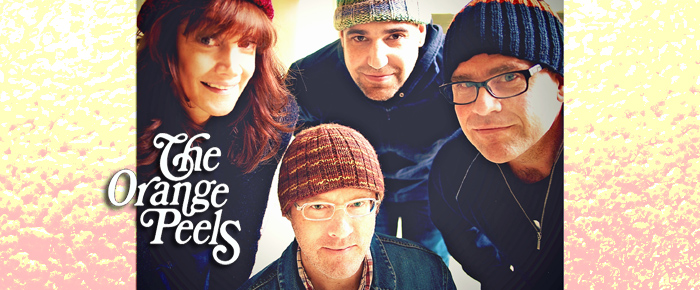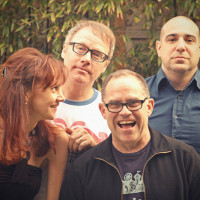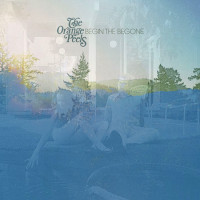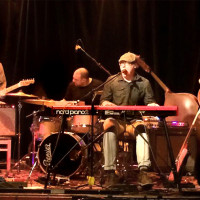
By Eleni P. Austin
Anyone wanting to hear some quintessential California music should look no further than The Orange Peels. The Bay Area band has been creating a pristine combo-platter of Baroque-Country-Folk-Pop for more than 20 years. It all began with Allen Clapp.
Growing up in Foster City, a tiny town between San Francisco and San Mateo, music was a constant companion. His mom and older sister taught him piano, he also studied violin.
By his teen years, Clapp had already cycled through a few nascent bands, with names like the Batmen, the Morsels, the Mummies and the Himalayans, (the latter featured future Counting Crows front man, Adam Duritz.)
During college, Clapp was half of the folky Goodfellows duo. They added bass, drums and harmonica and gigged around town variously as Huck, Hunk and Hulk. After that fell apart, he started recording solo. Armed with only a Radio Shack mic and a four-track cassette recorder he released a single through the tiny Four Letter Word label and that brought him to the attention of Bus Stop Records.
Clapp continued to record music under the moniker One Hundred Percent Chance Of Rain. A band in name only, the music was basically all him with a handful of bass parts played by his wife, Jill Pries. His melodic, albeit lo-fi Pop songs included gems like “Why Sting Is Such An Idiot,” (an answer song to the ex-Police front man’s solipsistic hit single, “If you Love Somebody, Set Them Free.”)
By 1994, Clapp was ready for a real band experience. Jill Pries became his fulltime bassist and he recruited old friends Larry Winther and Maz Kattuah to handle guitar and drums, respectively. Originally dubbed the Allen Clapp Orchestra, they were quickly re-christened the Orange Peels.
As the group was heading into the studio to record their debut, Maz Kattuah was replaced by drummer Bob Vickers. Square arrived in 1997 on the indie label, Minty Fresh. A shimmery slice of West Coast sunshine, the album was a breath of fresh air in an era of watered-down Grunge and bro-tastic Rap-Rock.
Their sophomore effort, So Far, was released on the SpinArt label in early 2001, and included multi-instrumentalist, John Moreman. So Far delivered on the promise made by the debut, another hook-filled masterpiece, it garnered airplay on underrated TV series like “Felicity” and “Ed.” (Remember the lawyer who owned a bowling alley?) It also established the pattern of a new album every four years.
2005 saw the release of their most assured effort to date, Circling The Sun. By now Ocean Blue guitarist, Oed Ronne had been added to the line-up. Like clockwork 2020 appeared in 2009, at that point, Bob Vickers departed the band and was replaced by Gabriel Coan. Sun Moon, recorded at their own Mystery Lawn studio, came out in 2013.
Traveling to the last show of their Sun Moon tour, Allen and Jill were involved in a serious highway crash. Stopped in traffic, they were slammed by a drunk driver speeding at 60 mph. Remarkably, the couple walked away with no lasting injuries.
Perhaps, imbued with a sense of carpe diem, the band seized the day. Reconvening at the Mystery Lawn studio, well ahead of their usual schedule, to write and record their sixth album, Begin The Begone.
Begin… begins with the insistent “Head Cleaner.” A throbbing tom-tom beat rides roughshod over coruscated guitar riffs and Clapp’s anxious vocals. Suffering from a little mixed up confusion he longs for some romantic clarity. “If I travel with you, will you show me your true self/And the more I’m with you, the more you could change my life/Gimme something will ya, to clear my head.”
The next two tracks, “Fleeing The Scene” and “New Moon” feel like a mini-suite. Despite muscular guitar chords, a chunky back beat, boomerang bass lines and carnival-esque synths, “Fleeing…” feels slightly torpid.
The lyrics address an overwhelming sense of malaise; “This is not the way to start the day, feeling falling, dragging, drawling.” The last request to bring “Something/Anything” is either an appeal for some form of emotional palliative, or a desire to listen to Todd Rundgren’s 1972 masterpiece for some quick inspiration.
As the tempo increases the instrumentation spins in tighter concentric circles nearly colliding into “New Moon.” That song opens with a glorious sunburst of keys and Clapp’s slightly energized falsetto vocals. An off-kilter rhythm kicks in over a kaleidoscopic guitar groove. (It’s all very goo-goo-g’joob).
There’s a bit of an exhale as they take a moment to enjoy their achievements. “When I think of how we got here, all I see is dust and hard work/When I think of that progression I can see the way to heaven.”
Three songs, “Embers,” “9” and “Satellite Song” feel like the heart and soul of the record. “Embers” splits the difference between early ‘80s Synth Pop and sunny, early ‘70s Soft Rock. Keys tinkle, guitars jangle and Clapp’s vocals are slightly Glam-tastic.
Beginning with his sardonic opening quip, “I remember yesterday like it was yesterday,” the scene is set for a bittersweet break-up. Despite an offer to be “your sacred cow or just your basket case” the writing is on the wall; “The fire’s flames blown, all you got left are embers, baby.” A piano coda ends the tune on a wistful note.
If “Pet Sounds”-era Beach Boys hooked up with Sergio Mendes and Buffalo Springfield, it might sound something like “9.” It opens with a hip-swiveling, accelerated Bossa Nova beat and then adds ringing, Countrified guitar and celestial synths. The lyrics obliquely reference the car accident Clapp and Pries miraculously walked away from, but the real focal point of the song is the spitfire guitar licks that flicker and flutter like a hummingbird on acid. The tune closes out with some winsome acoustic arpeggios.
Lush keyboards and breathy, ethereal vocals echo early ‘70s touchstones like Badfinger and “Wishing You Were Here” era Chicago. But “Satellite Song” is so much more, from the tart, hi-hat punctuation to the plangent piano notes that anchors the melody and especially the sparkling guitar solo that summons the spirit of George Harrison. The song is gossamer perfection. Keep the smelling salts close by for this one, you might actually swoon.
Two instrumentals, “Tidepool” and “Post & Beam” are smack in the middle of the record. The former is a lilting, minor-key waltz powered electric piano, spirally synths and a lone kick drum. It conjures up images of pastoral grace, and also recalls those “very special” montages in the “After School Special” TV movies. (It’s all very “Are You There God? It’s Me, Margaret”).
The latter is a cacophonous drum-centric track; kind of a latter day version of Led Zeppelin’s Bonham-riffic “Moby Dick.” Both tracks act as a musical sorbet, an aural palette cleanser if you will, in preparation for the grandeur of “9” and “Satellite Song.”
The album closes with “Wintergreen.” A sugar rush of acoustic guitars wash over piquant mandolin notes and a thumping bass drum, nearly camouflaging the lyrics’ pessimistic tone; “Seasons crashing into like waves upon the shore/Knock you down and take you for a ride.” But hard times, like the seasons, pass, and “summer” has them “feeling fine.” A hopeful end to an incandescent record.
Throughout their career, the Orange Peels have managed to strike a balance between musical ambition and comfortable familiarity. Begin The Begone improves upon that tradition. The band isn’t trying to set the world on fire, but with each album, their star burns a little brighter.











































